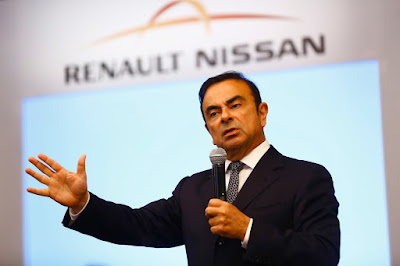Should Company Directors Be In Charge of Multiple Companies? Renault-Nissan’s Chairman the Latest to Feel the Heat of Investor Groups
Today’s post looks at the issue developing in the corporate
world concerning multiple Chairmanships, particularly with regard to leading
companies. Following on from investor unrest regarding the positions held by
the Chairman of Tesco, which will be discussed in this post, recent investor
action against the positions held by Renault-Nissan Chief Carlos Ghosn is
keeping this issue in the headlines. So, in order to make sense out of this we
will examine the two stories and look at how reasonable it is for one person to
hold multiple Chairmanships; with the recent and relative rise of shareholder
activism, it is likely that this issue will continue to arise.
Before we look at the issues within the French car
manufacturer, we need to revisit someone who we have discussed before here
in Financial Regulation Matters, and
that is the Chairman of Tesco, John Allan. Rather than focus on his comments
regarding gender equality, as we have already done, the turn of the year
represents a great example of the problem at hand here. In September last year,
Allan had to take action so as not to become ‘the
U.K.’s only triple chairman of FTSE 100 companies’. In removing himself
from the role of chairman and taking up the position of non-executive director
in the payments group Worldpay, Allan
had sought to pre-empt what ‘might well be a negative reaction to somebody
attempting to be the Chairman of three FTSE 100 companies’, although he does
remain as the chairman of London First, a business lobby group, albeit non-FTSE
100. However, this pre-emptive movement to avoid being a triple-chairman has
not stopped investors at Tesco focusing on his other Chairmanship, namely that
of Barratt Developments, a
leading property builder. A number of institutional investors in Tesco are alleging
that as Chairman of such an expansive company like Tesco, Allan should be ‘devoting
considerable time to the role’ which, through a proposed opposition to
Allan’s reappointment as Chairman, the investor group notes is ‘considered to
be crucial to good governance’. The group make the point, rather emphatically,
that a Chairman must be present and devoted as they are, ideologically speaking,
‘responsible for the culture of the board’ and that without that leadership the
board may be, at best, inefficient and, at worst, negligent or transgressive.
The source of that fear is obviously the recent
accounting scandal at Tesco, but the notion of Director responsibility is a
truly important one when considering what ‘governance’ actually is, and also
how best to achieve it – although different in nature, the situation on the
other side of the Channel also brings this issue into focus.
Earlier this month, the French financial markets regulator,
the Autorité des Marchés Financiers (AMF), received
a 24-page letter from three shareholder activist groups requesting for
Renault-Nissan to be put under review for potential conflicts of interest at
Board level, and also possible governance breaches. The main target of the
request, the embattled
Renault CEO and Chairman Carlos Ghosn, is also currently the Chairman of Mitsubishi
and Chairman of Nissan – he was also the CEO of Nissan up until last year –
which amounts to an incredible workload leading these sector-leading companies.
Although there are suggestions Ghosn is preparing
his successor so as to facilitate the cohesion between the companies when
he steps down, this has not stopped investor groups seeking investigation into
the workings of the Board at Renault. Demonstrating their motive as
institutional investors, the group of three state that ‘we believe an
investigation is urgently needed to uphold the rights of Renault shareholders’,
with the main focus being on the ‘creeping
transfer of powers’ to a Dutch-listed joint venture between Renault and
Nissan which, according to the three investor groups, has resulted in a
reduction in ‘adequate
governance mechanisms or protections for Renault shareholders’. Though the
AMF have refused to comment so far, the recent tension between the then-Finance
Minister Emmanuel Macron and Ghosn – as the French Government owns a 20% stake
in the company – potentially indicates a rough ride for Ghosn now that Macron
is President. Ultimately, the role of the Chairman is coming into view more and
more, and this is a positive element.
It is a positive element because it is important that we
seek to ask some serious questions if we are to achieve good governance more
generally. In order to provide for some sort of societal balance, a number of
actors must fulfil their roles adequately and, in terms of the business arena,
it seems as if though institutional investors are finally stepping up to the plate, as we have already discussed here
in Financial Regulation Matters. In
order for big business to behave in a sustainable and socially-considerate
manner, the culture that begets that
ideal must be set at the very top – in light of that, how likely is that to
happen if the Chairman is concurrently running two, three, or even more
companies at the same time? Whilst institutional investors will call for capped
Chairmanships to protect their own position, as is their right, the enforcement
of capped Chairmanships would likely have a positive societal effect also. It
is important that the leading supermarket is controlled with complete focus
given its centrality to a given society, and it is vital that one of the leading
manufacturers of cars is controlled with complete focus, particularly given the
environmental impact of failings in this area i.e. Volkswagen’s infamous struggles in this area. Hopefully,
the investors increase the pressure they are putting these large companies
under to force regulators to take action, because without that pressure only
scandal can affect change, which is a particularly negative dynamic.





Comments
Post a Comment